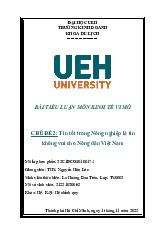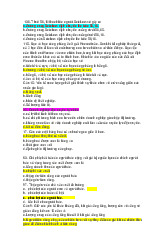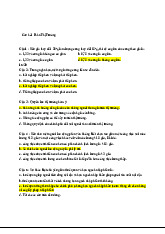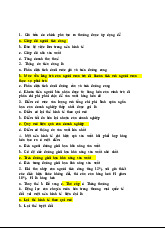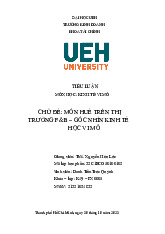



















Preview text:
lOMoAR cPSD| 46988474 1 lOMoAR cPSD| 46988474
Understand the nature of the economic problem.
Understand the principles of how people make decisions.
Understand the principles of how people interact.
Understand the methodology of economics.
Understand economic models: Circular-Flow Diagram, Production Possibilities Frontier
Chapter 1 and Chapter 2; Principles of Economics (2021), N.Gregory Mankiw; South Western Cengage Learning, 9 1 2 3 4 lOMoAR cPSD| 46988474 3 lOMoAR cPSD| 46988474 lOMoAR cPSD| 46988474
Would your scarcity problem disappear if you were rich?
All of us face scarcity. So, what should we do? 5 lOMoAR cPSD| 46988474
PRINCIPLE 1: PEOPLE FACE TRADE-OFFS lOMoAR cPSD| 46988474 11 2. HOW PEOPLE MAKE DECISIONS
Opportunity cost is the cost of doing something measured in terms of the best alternative forgone.
Minh Trang is considering going to a movie with a ticket price of $35. She
estimates that the cost of driving to the cinema and parking there will total
an additional $20. In order to attend the cinema, Minh Trang will have to take
time off from her part-time job or forgo studying for an exam scheduled for
the next morning. She estimates that she will lose 5 hours at work, at a wage
of $6 per hour, or 5 hours of study time. If Minh Trang considers working as
the best alternative use of her time, find her opportunity cost of going to the cinema?
OC of (going to the cinema) = value of (doing a part-time job)
Minh Trang is considering going to a movie with a ticket price of $35. She
estimates that the cost of driving to the cinema and parking there will total an
additional $20. In order to attend the cinema, Minh Trang will have to take time
off from her part-time job or forgo studying for an exam scheduled for the next
morning. She estimates that she will lose 5 hours at work, at a wage of $6 per 7 lOMoAR cPSD| 46988474
hour, or 5 hours of study time. If Minh Trang considers working as the best
alternative use of her time, find her opportunity cost of going to the cinema?
OC of (going to the cinema) = value of (doing a part-time job) = $85
Bảo Khuê is considering to travel from Hanoi to Bangkok. The trip takes 1 hour by plane OR 5
hours by bus. Airfare is $90 and the bus fare is $30.
When she is not traveling, she can work and earn $30/hour. Suppose working is her best alternative of travelling.
Answer the following questions Solution lOMoAR cPSD| 46988474
a.What is the opportunity cost (OC) of traveling by bus?
b.What is the OC of traveling by plane?
c. Which mode of travel has lower OC?
d. How would the answers be different for Minh Trang
who can work and earn $6/hour when she is not traveling?
Which of the following statements best represents the principle represented by the adage, "There is no such thing as a free lunch"?
a) Khuê must decide between going to Đà Nẵng or Đà Lạt for spring break.
b) Khuê can attend the concert only if she takes her sister with her.
c) Bảo is hungry and homeless.
d) Bảo must repair the tire on his bike before he can ride it to class. 9 lOMoAR cPSD| 46988474
Trang decides to spend two hours taking a nap rather than attending her classes (her best alternative). Her
opportunity cost of napping is
a) the $24 she could have earned if she had worked at her job for those two hours.
b) the value of the knowledge she would have received had she attended class.
c) the value of her nap less the value of attending class.
d) nothing, since she valued sleep more than attendance at class.
When calculating the cost of college, which of the following should you probably not include? a) the cost of tuition
b) the cost of books required for college classes c) the cost of meals
d) the income you would have earned had you not gone to college lOMoAR cPSD| 46988474
A music label is considering making an album for a young artist. The
total investment of making album is $300,000.
After the completion of making music album, the music label will
decide the quantities of CDs launched to the market. Each CD costs $2.
In the first 3 months, the music label plans to produce 10,000 CDs at the price $10/each CD.
In the next 3 months, the music label plans to produce 5,000 CDs at the price $5/each CD.
In the 3 months after next, the music label plans to produce 2,000 CDs at the price $1/each CD.
Analyze the music label’s decision.
To produce a typical CD, the music label spend approximately $300,000 on making the album.
When the music label decide whether to produce a CD for an
artist, the $300,000 investment is important.
But once an artist is signed and the investment is made, every new copy costs only $2.
As long as companies can sell that copy for more than $2, or the marginal benefit bigger
than the marginal cost, it is better off making the copy.
The original investment made to create the music is irrelevant —
. Sunk costs are costs that cannot be avoided because they have already been incurred. 11 lOMoAR cPSD| 46988474 CHECK POINT
Consider an airline deciding how much to
charge passengers who fly standby. Suppose that
flying a 200-seat plane from Hanoi to HCMC costs
the airline $100,000. Imagine that a plane is about
to take off with ten empty seats, and a standby passenger waiting at the gate
will pay $300 for a seat. Should the airline sell the ticket? lOMoAR cPSD| 46988474 PRINCIPLE 3: RATIONAL PEOPLE THINK AT THE MARGIN 23
Suppose the cost of operating a 100 room hotel for a night is $10,000 and there are 5 empty rooms for tonight. If the
marginal cost of operating one room for one night is $30 and a customer is willing to pay $60 for the night, the hotel manager should
a) rent the room because the marginal benefit exceeds the marginal cost.
b) rent the room because the marginal benefit exceeds the average cost.
c) not rent the room because the marginal benefit is less than the marginal cost.
d) not rent the room because the marginal benefit is less than the average cost.
Ms Thu, your lecturer loves her work, teaching economics. She has been offered other positions in the movie industry, but
she has decided to continue working as a lecturer. Her decision would not change unless the marginal
a) benefit of teaching increased.
b) cost of teaching increased.
c) cost of a corporate job increased.
d) benefit of a corporate job decreased.
You have drunk two cups of bubble tea. You consider drinking a third. As a rational consumer you should make your choice by comparing
a) the benefits from drinking all three cups to how much three cups costs.
b) the benefits from drinking all three cups to how much one more cup costs.
c) the benefits from drinking one more cup to how much one more cup costs.
d) the benefits from drinking one more cup to how much three cups costs. 13 lOMoAR cPSD| 46988474
Because rational people make decisions by weighing costs and benefits, their
decisions may change in response to incentives.
incentive: something that induces a person to act, i.e. the
prospect of a reward or punishment.
Many public policies change the costs and benefits that people face. Sometimes
policymakers fail to understand how policies alter incentives and behavior and a
policy may lead to unintended consequences.
Example: Seat belt laws increase the use of seat belts but lower the incentives of individuals to drive safely.
This leads to an increase in the number of car accidents.
This also leads to an increased risk for pedestrians. lOMoAR cPSD| 46988474 CHECK POINT:
A 1996 bill reforming the federal government’s antipoverty programs limited
many welfare recipients to only two years of benefits. 26 a.
How does this change affect the incentives for working? b.
How might this change represent a trade-off between equality and efficiency? 15 lOMoAR cPSD| 46988474 PRINCIPLE 4: PEOPLE RESPOND TO INCENTIVES 27 FUNDAMENTAL ECONOMIC QUESTION
which techniques are to be adopted? lOMoAR cPSD| 46988474
selection of the category of people who will consume the goods FUNDAMENTAL ECONOMIC QUESTION ECONOMIC SYSTEMS
For every society the answers to the three basic questions depend on what kind of economic system it uses. The
term economic system refers to the way in which a society organizes the production and distribution of good and services.
allocates resources allocates resources
contains features of through the through administrative
both the market and decentralized decisions decisions. All the
planned economic of many firms and
economic decisions are systems, with the households as they taken by the
government intervening interact in markets for government.
in various ways to goods and services. influence market prices. market plannedcommand / mixed economy economy economy
PRINCIPLE 6: MARKETS ARE USUALLY A GOOD WAY TO ORGANIZE ECONOMIC ACTIVITY 17 lOMoAR cPSD| 46988474
Adam Smith and the Invisible Hand
Passages from The Wealth of Nations, 1776
“Man has almost constant occasion for the help of his
brethren, and it is vain for him to expect it from their benevolence only.
He will be more likely to prevail if he can interest their
self-love in his favor, and show them that it is for their
own advantage to do for him what he requires of them…
It is not from the benevolence of the butcher, the
brewer, or the baker that we expect our dinner, but Adam
Smith, from their regard to their own interest…. 1723-1790
Adam Smith and the Invisible Hand
Passages from The Wealth of Nations, 1776
“Every individual…neither intends to promote the public
interest, nor knows how much he is promoting it….
He intends only his own gain, and he is in this, as in many
other cases, led by an invisible hand to promote an end
which was no part of his intention.
Nor is it always the worse for the society that it was no part of
it. By pursuing his own interest he frequently promotes that
of the society more effectually than
Adam Smith, when he really intends to promote it.” 1723-1790 lOMoAR cPSD| 46988474
The invisible hand will only work if the
market power: the ability of a single
economic actor (or small group of actors) to
government enforces property rights.
have a substantial influence on market
There are two broad reasons for the government prices.
to interfere with the economy: the promotion of
efficiency and equality. Government policy can
improve efficiency when there is market
failure, such as externalities or market power. PRINCIPLE 7: GOVERNMENTS CAN SOMETIMES IMPROVE MARKET OUTCOMES
property rights: the ability of an individual
to own and exercise control over scarce resources.
market failure: a situation in which a market
left on its own fails to allocate resources efficiently. 19 lOMoAR cPSD| 46988474
externalities: the impact of one person’s
actions on the well-being of a bystander.
